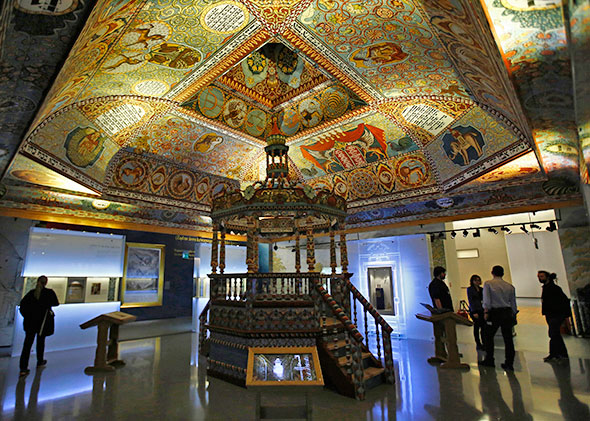Australia/Israel Review
The Last Word: A Unique Gathering
Sep 18, 2015 | Jeremy Jones

Jeremy Jones
Visiting the new POLIN Jewish Museum in Warsaw can be a challenging experience. In the heart of the destroyed ghetto, a site of immense evil, of persecution and deprivation, a walk through its many impressive exhibitions is a walk in the company of ghosts.
With cultural, historical and political reference points specifically Polish, it should help Jewish visitors learn as much about that nation as its gives Poles greater understanding of Jews.
I was guided through POLIN by a non-Jewish Pole who has dedicated his life to combating racism and extremism and by a Moldovian, also non-Jewish, who is a significant academic authority on both the Shoah and contemporary nationalism and fanaticism.
The Museum, which puts on display the immensity of the historic place of Jews in Polish lands and in Polish society and culture, should play a part in undoing stereotypes and the vision of Jews as one-dimensional outsiders.
There will be charges, for example, that some sections sanitise or whitewash history, misrepresent Jews and Judaism, require commentary of greater depth than is presented – and some of these will be reasonable. But overall, the Museum stands as a monument to goodwill.
I was in Warsaw on my way out of Europe, having come to the continent to participate in the “Muslim Jewish Conference 2015” (MJC15) on the rural outskirts of Berlin.
Nearly 150 young people, current and potential change makers, brought open minds, intelligence, energy and vision to a quite unique gathering.
Coming from six continents and nearly 50 countries, they committed themselves to a week of learning about the other and about themselves, under the guiding hand of an efficient and effective team of past participants and local volunteers.
The Jewish delegates came from countries as diverse as Australia and Azerbaijan, Israel and Argentina, Morocco and Norway. The Muslims came from Malaysia, Finland, Sudan, Pakistan, Bosnia, Egypt and many other countries in Europe, the Americas, Africa and Asia. There were people with other, and mixed, religious and cultural backgrounds, with the qualification for participation being an openness to learning and sharing wisdom.
Most of the week involved working groups on a range of important subjects – supplemented with events at the Ministry for Foreign Affairs, addressed by government officials, intellectuals and the US Government’s envoys on antisemitism and to Muslim communities.
A moving session on the Shoah and the Bosnian genocide, addressed by survivors and experts, followed by a screening of a documentary on the way Rwandans are being guided by victims of Nazism, provided inspiration to do good, rather than any sense of despair.
I was involved in sessions in interfaith dialogue and on Jewish beliefs/attitudes on a range of subjects, partnered by an impressive Muslim scholar from Canada. More importantly, I was available for delegates, Muslim, Jewish and other, to discuss an enormous range of concerns.
Many expressed interest in my speaking tour of Indonesia (see AIR September 2015) and the discussions which took place in that environment. The unfortunate reality is that there are a number of Muslim societies in which such discussions would put both me, as a visiting Jewish speaker, and my hosts, at risk.
Indeed, some participants were taking a gamble with their futures through participation in MJC, and others present had already encountered difficulties as a consequence of promoting human values involving dialogue.
Over the period of a week, the changes in attitudes, informed by knowledge and genuine human engagement, were almost tangible. From some hesitant early contact, the enthusiasm with which participants prayed or observed Muslim Friday prayers, and took part in, or simply absorbed the energy of, the Jewish Sabbath and Havdalah services demonstrated the impact of the superbly designed program.
There are now 600 alumni of these Conferences, and many examples of the positive impact the time together has had on the lives of individuals and on the communities to which they have returned.
Not every participant in MJC15 will change the world, but all of them are now much better equipped to recognise, and confront, destructive prejudices and bigotry.
This article is featured in this month’s Australia/Israel Review, which can be downloaded as a free App: see here for more details.






